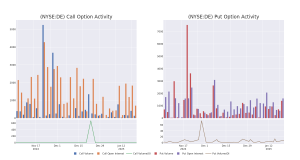(Bloomberg) — Taiwan Semiconductor Manufacturing Co. (TSM, 2330.TW) projected quarterly sales and capital expenditure ahead of analysts’ estimates, fueling hopes that spending on AI hardware should remain resilient in 2025.
Most Read from Bloomberg
The main chipmaker to Apple Inc. (AAPL) and Nvidia Corp. (NVDA) foresees spending $38 billion to $42 billion on technology and capacity this year, or up to 19% more than analysts anticipated. It predicted revenue of $25 billion to $25.8 billion in the March quarter, as much as 6% above projections. Shares in TSMC suppliers including Tokyo Electron Ltd. (TOELY, TKY.HA) and Advantest Corp. (ATEYY, 6857.T)spiked in Asia.
TSMC’s strong performance buoyed optimism around an unprecedented AI spending cycle that drove the likes of Nvidia to new heights. The advent of ChatGPT spurred a frenzied datacenter build-out over the past two years, benefiting a host of companies that provide the piping and brains of the AI boom.
Still, the lack of a big profit-generating AI application so far stoked concerns about a potential bubble. And like much of the industry, TSMC is grappling with uncertainties stemming from a US-China tech conflict that threatens to disrupt supply chains and stem the flow of chips around the world. The US this month announced new export control rules on AI chips to curtail their supply to China.
Away from AI, TSMC remains heavily reliant on consumer electronics and smartphones, given Apple remains its largest customer. IPhone sales have proven muted, though the industry expects mobile AI features to expand over time, driving the broader market.
On Thursday, Chief Executive Officer C.C. Wei warned that smartphone unit growth will remain in the low-single-digits in 2025. But he added that there would be mild recovery in segments other than AI.
The world’s biggest chipmaker reported a better-than-expected 57% rise in net income.
“For the driver, besides the ongoing robust AI chip demand, there will be support from new smartphone chips and AI PCs, possibly more outsourcing orders from Intel, and WiFi 7 chips,” Bloomberg Intelligence analyst Charles Shum said about the 2025 revenue outlook.
What Bloomberg Intelligence Says
TSMC may be able to retain over half of its existing orders from China, following the Biden administration’s restrictions on advanced-chip production for country-exempt chips with fewer than 30 billion transistors, as reported by Bloomberg News. This would allow TSMC to maintain sales of smartphone SoCs and mid-range computing chips for China. Chinese chip orders accounted for 12.6% of TSMC’s revenue in January-September.

